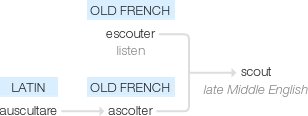Scout
late Middle English (as a verb): from Old French escouter ‘listen’, earlier ascolter, from Latin auscultare . scout1 (sense 5 of the noun) (early 18th century) is of uncertain origin.
wiktionary
From Middle English scout, scoult, from Old French escoute(“action of listening”), verbal noun from escouter(“to listen, heed”), from Latin auscultare(“to listen”). The verb comes from the noun. [1]
Of North Germanic origin. Compare Old Norse skúta, skúti(“taunt”), Middle English scoute(“a wretch, rascal, rogue”); thus may be related to English shout.
From Middle English scoute, skoute (also schoute, shoute, schuyt), from Middle Low German schûte or Middle Dutch schute; or possibly from Old Norse skúta(“a small craft or cutter”).
From Middle English scouten(“to jut out, project”), from Old Norse skúta(“to jut out”), cognate with Icelandic skúta(“to jut out”).
scout (third-person singular simple present scouts, present participle scouting, simple past and past participle scouted)
etymonline
scout (v.1)
late 14c., "observe or explore as a scout, travel in search of information," from Old French escouter "to listen, heed" (Modern French écouter), from Latin auscultare "to listen to, give heed to" (see auscultate). Related: Scouted; scouting.
scout (v.2)
"to reject with scorn," 1710, earlier "to mock" (c. 1600), of Scandinavian origin (compare Old Norse skuta, skute "to taunt"), probably from a source related to shout (v.). Related: Scouted; scouting; scoutingly.
scout (n.)
"person who scouts, one sent out to gain information," 1550s, from scout (v.1). Boy Scout is from 1908. Scout's honor attested from 1908.
